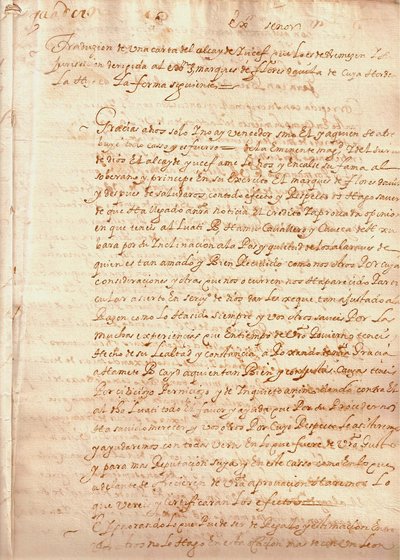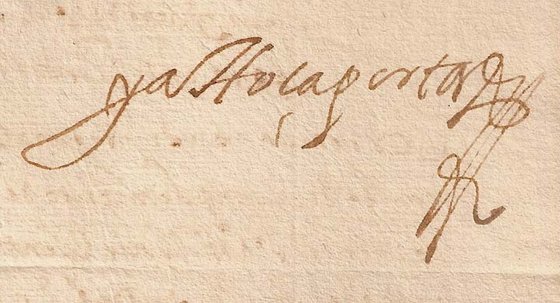LETTRE AU MARQUIS FLORES D'AVILA
Sasportas, Yaho (Jacob)
| Numéro d'objet: |
4495 |
| Date: |
1637 |
| Genre: |
Livre Manuscrit |
| Lieu: |
Oran |
| Sujet: |
Diplomatie |
Recherche dans "Notes":
AUTOGRAPH LETTERS BY YAHO SASPORTAS (= RABBI JACOB SASPORTAS?) LEADERS OF THE SEPHARDIC JEWISH COMMUNITY OF ORAN (ALGIERS), MEMBER OF THE PROMINENT, ANCIENT SEPHARDI SASPORTAS FAMILY
Document 1: autograph letter by Yaho (= Yacob = Jacob) Sasportas
Description of the document
Brown ink on paper. 2 leaves (31.5 x 21.3 ems) + 2 coverleaves (32 x 21. 7 ems). In good condition.
Three different handwritings:
1. 18th_19th century archive note of classification on coverleaf(a bit faded): “Estado de Flores Davila" , "H 6, Legajo 90" [= Estate of [the Marquis] Flores de Avila], [Document 90]
2. 17th I 18th century by other Spanish cursive hand, on coverleaf (a bit faded but legible),. it is a summary of the content of the letter by Yaho Sasportas:
Traduzion de vna carta I del alcayde Yuyef I que lo es de Tremezen. y su juris-
dizion, dirigida al Ex[ celentisi]mo senor I Marques de flores Dauila de/ cuia orden se hizo en la forma/ siguiente. -/ [ ... ]
Translation of a letter of the Alcaide ofTlemcen and his jurisdiction Yuçef, addressed to his Excellency Senor the Marquis of Flores d 'Avila, made by me on his Order. in the following manner: [ . .]
3. 17th century Spanish cursive, the main letter text, signed by Yaho Caportas (alternatively pronounced/spelled as Sasportas, Sasporta and Saporta), fo1. 1 recto - fot 2 Yerso.
Content
Autograph report signed by Yaho Sasportas, Royal Translator to the King of Spain, addressed to the Marquis of Flores Davila, dated Oran, 5 February 1637
Translation of a letter by the Arab military governor ofTlemcen,. Yuçef, addressed to the Governor of the Spanish stronghold of Oran, with a commentary by Yaho Sasportas in his function of royal translator and charge d' affaires of the Marquis de Flores Davila Containing:
The translated letter by Yuçef including:
•a praise to the Marquis de Flores Davila for his support of the Arab ally Luati ibn Hamu; and for his help against Hamed ibn Zayd
•the gift of a Lion, from the palace of Luati ibn Hamu, as a token of his gratitude towards the Marquis, symbolizing also the courage of his Spanish ally
The remarks by Yaho Sasportas containing:
• the authentification of the translation by Yaho Sasportas
.the gift, in return, of a precious hat, handkerchiefs, very fine clothing, a silver tobacco box and tobacco chest, all highly refined and expensive presents, bought and sent by Sasportas on the instruction of the Marquis; the expenses forwarded by Yaho Sasportas
•the report of the extraordinary gratitude of the governor ofTlemcen, Yuçef, even permitting the sale of wheat from Tlemcen to the Spanish troops, which appears to be an exceptional gesture of sympathy by an Arab ally towards the Spaniards.
Apart from its interest as a letter written possibly by the later Haham Jacob Sasportas, this letter is of extraordinary interest for its precious details on the refined diplomacy between the Spaniards and the Arab princes in 17th century North Africa. At the same time, the accompanying report by Sasportas demonstrates that his highly prestigious position as Royal Translator to the Spanish Crown was by far not limited to the passive exercise of translating Arabic texts, but that he was an influential, wealthy person, and a key intermediary between the Arab princes and the Spanish King.
Rapport autographe signé par Yaho Sasportas, traducteur royal du roi d'Espagne, adressé au marquis de Flores Davila, daté d'Oran, le 5 février 1637
Traduction d'une lettre du gouverneur militaire arabe de Tlemcen,. Yuçef, adressée au gouverneur de la place forte espagnole d'Oran, avec un commentaire de Yaho Sasportas en sa qualité de traducteur royal et chargé d'affaires du marquis de Flores Davila contenant :
La lettre traduite par Yuçef comprenant :
-un éloge au marquis de Flores Davila pour son soutien à l'allié arabe Luati ibn Hamu ; et pour son aide contre Hamed ibn Zayd
-le don d'un Lion, du palais de Luati ibn Hamu, en témoignage de sa gratitude envers le Marquis, symbolisant aussi le courage de son allié espagnol
Les remarques de Yaho Sasportas contenant :
- l'authentification de la traduction par Yaho Sasportas
.le don, en contrepartie, d'un chapeau précieux, de mouchoirs, de vêtements très fins, d'une boîte à tabac en argent et d'un coffre à tabac, tous cadeaux très raffinés et très chers, achetés et envoyés par Sasportas sur instruction du Marquis ; les frais transmis par Yaho Sasportas
-le rapport de l'extraordinaire gratitude du gouverneur de Tlemcen, Yuçef, qui a même permis la vente de blé de Tlemcen aux troupes espagnoles, ce qui apparaît comme un geste exceptionnel de sympathie d'un allié arabe envers les Espagnols.
Outre son intérêt en tant que lettre écrite peut-être par le futur Haham Jacob Sasportas, cette lettre est d'un intérêt extraordinaire pour ses précieux détails sur la diplomatie raffinée entre les Espagnols et les princes arabes en Afrique du Nord au XVIIe siècle. En même temps, le rapport de Sasportas qui l'accompagne démontre que sa position très prestigieuse de traducteur royal de la couronne espagnole ne se limitait pas, et de loin, à l'exercice passif de la traduction de textes arabes, mais qu'il était une personne influente et riche, et un intermédiaire clé entre les princes arabes et le roi d'Espagne.
Historique:
Jacob ben Aaron Sasportas (1610 – April 15, 1698), was a Rabbi, Kabbalist, and anti-Shabbethaian.
He was the father of Isaac ben Jacob Sasportas.
Sasportas was born at Oran. He became rabbi successively of Tlemcen (at the age of twenty-four), Marrakesh, Fes, and Salé. In about 1646 he was imprisoned by the Moorish king, but succeeded in escaping with his family to Amsterdam (ca. 1653). He stayed there till the disorders in Africa ceased, when he was called back by the King of Morocco and sent on a special mission to the Spanish court (ca. 1659) to ask for aid against the rebels. On his return he was invited to the rabbinate of the Portuguese community of London (1664). According to David Franco Mendes (in "Ha-Meassef," 1788, p. 169), Jacob had accompanied Menasseh ben Israel to London in 1655. Owing to the outbreak of the plague in London in 1665, Jacob went to Hamburg, where he officiated as rabbi till 1673. In that year he was called to Amsterdam and appointed head of the yeshivah Keter Torah, founded by the brothers Pinto. Two years later he became dayyan and head of the yeshivah at Leghorn (Livorno), and in 1680 he returned to Amsterdam, where he was appointed head of the yeshivah 'Eitz Hayyim. After the death of Isaac Aboab da Fonseca (1693) he was appointed rabbi of the Portuguese community, which office he held till his death at Amsterdam.
Jacob was one of the most violent antagonists of the Shabbethaian movement; he wrote many letters to various communities in Europe, Asia, and Africa, exhorting them to unmask the impostors and to warn the people against them.
Grätz ("Gesch." x., note 2) identifies Jacob Sasportas with Jaho Saportas, who competed with the Cansinos for the office of interpreter at the Spanish court (Jacob Cansino's preface to Moses Almosnino's "Extremos y Grandezas de Constantinople," Madrid, 1638). His works had a great influence on Aaron ben Samuel.



